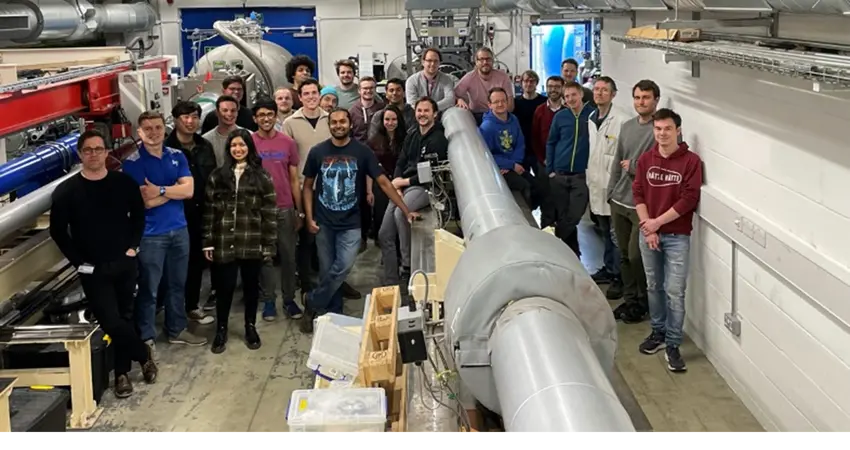26 Oct 2022
DPhil graduate wins UK Doctoral Researcher Award 2022
Engineering Science DPhil graduate, Hassan Saad Ifti, wins the 2nd prize in engineering at the 2022 Doctoral Researcher Awards in a UK-wide competition.

Hypersonics Group

 Hassan Saad Ifti, a recent Engineering Science DPhil graduate, has won the 2nd prize in the engineering category at the 2022 Doctoral Researcher Awards (DRA), a UK-wide academic competition that is awarded annually to junior researchers with promise to be amongst the world class academics of the future. Hassan won this award for the scientific contributions in his doctoral thesis entitle, “Transpiration Cooling of a Hypersonic Vehicle”.
Hassan Saad Ifti, a recent Engineering Science DPhil graduate, has won the 2nd prize in the engineering category at the 2022 Doctoral Researcher Awards (DRA), a UK-wide academic competition that is awarded annually to junior researchers with promise to be amongst the world class academics of the future. Hassan won this award for the scientific contributions in his doctoral thesis entitle, “Transpiration Cooling of a Hypersonic Vehicle”.
Today’s rockets are not reusable like commercial aircraft, and therefore the cost of space travel is astronomically high and thus inaccessible to the public. The aim of his research is to make reusability of rockets a tangible reality and thereby take humanity one step closer to affordable space travel. Rockets are hypersonic vehicles, i.e. vehicles that fly faster than five times the speed of sound. Unlike supersonic jets (e.g. Concorde), hypersonic vehicles face tremendous heat due to aerodynamic heating (heating by air friction). Temperatures around the vehicle could go beyond 10,000 °C — far above the melting point of any known material. Rockets therefore have a heat shield that melts away when they reenter Earth’s atmosphere. This technology, however, is not reusable.
A promising technology that could increase the degree of re-usability of rockets is transpiration cooling — a method where a cooling gas is injected through a porous material, which creates an insulating blanket around the vehicle. However, this blanket diminishes as it mixes with the fast, hot gas flowing around the vehicle. The physics of this mixing must be known to determine how much coolant is required for a mission. This mixing physics (mechanism) was unknown so far for laminar flows, where there is no turbulent mixing. Through his work, experimental data on transpiration cooling in a hypersonic flow employing a novel porous material, made of zirconium dirboride, were reported for the first time. Hassan then developed an analytical prediction model based on one-dimensional diffusion. The analytical model successfully predicts the experimental data, proving that the mixing mechanism is fundamentally driven by diffusion. This analytical model is a rapid designing tool for budgeting the amount of coolant required for a mission that would utilise transpiration cooling.
DRA is a UK-wide academic competition that is awarded annually to junior researchers who are pursuing (or have recently completed) doctoral degrees in the UK. Based on the merit of their doctoral research, the top five applicants are nominated as finalists each year from hundreds of excellent applicants across the UK in three different categories. The finalists are invited to the awards ceremony where they present their work to a panel of experts. A prominent scientist is invited every year as the keynote speaker. This year, Professor Jack Szostak, 2009 Nobel Laureate in Physiology or Medicine, delivered the keynote speech. He shared details on how he found his area of interest, his work throughout the years, and how he won the Nobel prize. Professor Szostak motivated the 2022 DRA winners to pursue their interest in science. The ceremony ended with Dr Nastaran Ranjbar of Springer Nature, who invited the DRA winners to publish a mini-review in the SNAS journal.
Hassan’s research at the Department was conducted within the Hypersonics Group at the Oxford Thermofluids Institute and supervised by Professor Matthew McGilvray. His project was funded by UK's Engineering and Physical Sciences Research Council (EPSRC). Hassan is currently a Postdoctoral Associate in High-Speed Aerodynamics at the University of Maryland, College Park, USA, working with Professor Stuart Laurence. His current project investigates the effects of rain on hypersonic vehicles and is funded through a Multidisciplinary University Research Initiative (MURI) grant from the US Department of Defense (DoD).





